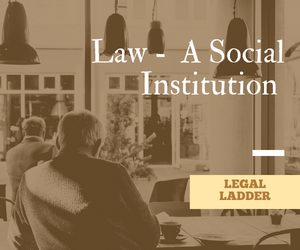LAW AS A SOCIAL INSTITUTION TO SATISFY SOCIAL WANTS- ROSCOE POUND
Introduction:
Nathan Roscoe Pound was an American legal scholar and educator who lived from October 27, 1870 to June 30, 1964. Pound is one of the most referenced legal experts of the twentieth century, according to the Journal of Legal Studies.One of the most influential persons in twentieth-century legal philosophy was Roscoe Pound.
Pound worked to relate law and society through his "sociological jurisprudence".R. Pound wrote many books on the same topic. Pound's approach to sociological jurisprudence was unique in that he attempted to include all aspects of social life, in contrast to his forefathers, who saw law as the primary subject of study and society as a simple adjunct.
He focuses on the practical side of law, emphasizing the importance of studying law in relation to and as part of the overall process of social control. Prior to Pound, Jeremy Bentham believed that the goal of legislation should be to achieve social purposes, and that in order to accomplish so, individual interests must be balanced with community welfare.
He described law as the set of rules, concepts, conceptions, and standards that govern action and decision-making, as well as the precepts and doctrines that govern professional art norms. As per him, "law is not a set of rules, but a strategy or technique for reconciling competing societal interests." According to him, the goal of law is to create the most efficient social organization possible by satiating the greatest number of desires with the least amount of friction and wastage. Adjusting human interactions, organizing human conduct, and, most all, "balancing opposing interests" in society will be required. He refers to this critical endeavour as"social engineering."
Courts, lawmakers, legal scholars, and others must strive to strike a balance between society's opposing interests. Law as a social institution to satisfy social wants is an aspect of Social Engineering.
Pound divided interests into three categories: private, public, and social. Personal interests (protected by criminal law, commercial law, constitutional law, and so on), marital life, property, and so on are examples of private interests."Public interests" are defined as "interests in the maintenance of the state, as well as the state's role as a protector of societal interests such as trust management, environmental protection, and so on." Interests in the maintenance of peace, health, social institutions, general morality, general advancement (freedom of trade and commerce, freedom of speech and expression, and so on) as well as interests that promote human individuality are all examples of social interests.
Pound proposed "jural postulates" - a kind of ideal norm that law should seek in society in order to assess competing interests in the proper order of precedence. Every society's core assumptions are based on these basic assumptions. There are five jural postulates of the legal system of a society.
Men must be able to assume that in a civilized society:
Others will not engage in intentional violence against him.
They may exercise control over what they have discovered and taken for their own use, as well as what they have made through their own labour.
Those with whom they interact as members of society will act in good faith and, as a result, will set fair expectations based on their vows, and so on.
Those who engage in a particular course of action will take reasonable precautions to avoid injuring others.
Others who preserve items or use agencies that are useful in one area but destructive in another will keep them within their rightful boundaries.
Thus, the jural postulates serve as instructions for living a righteous and civilized life, attempting to establish a balance between reality and idea, as well as power and social accountability of individuals in society. These postulates, according to Pound, are not absolute but have a relative value. They are dynamic in nature.
As a result, the law serves as a tool for social control. The goal of social engineering is to create the most efficient social system feasible. For example, if a factory is polluting the environment and an injunction suit is filed to shut it down, the court must weigh various claims and interests, such as the mill owner's right to operate his business, the factory workers' right to keep their jobs, and the right of local residents to live in a clean environment.
In brief, Pound's theory holds that the basic subject matter of law is interests, and the aim of law is to satisfy human wants and desires. It is a legal obligation to conduct a "value of interests," or, in other words, to "choose the most socially useful objectives and obtain them." This is all really an experiment. Pound's 'experimental jurisprudence' served to emphasise the crucial link between laws, their administration, and society's life. Pound's biggest contribution to jurisprudence is his focus on how the law actually works in society. Pound's method was termed by Allen as "experimental jurisprudence."
His hypothesis is nothing more than a test. "Pound intended to underscore the necessity for judicial knowledge of social values and interests," Justice Cardozo correctly observed. "Pound's compelelty neglected the personal liberties that are as fundamental for a happy social living," Allen added.Pound's 'engineering' metaphor has been attacked for implying a system of purely mechanical expedients mechanically applied to social demands. Second, his argument assumes that society has progressed to the point where his results can be applied widely. For example, in a mass society like India, it's difficult to imagine how individuals would express their demands, wants, and so on, given that the vast majority of people lack the ability to communicate and are illiterate.As a result, Pound's idea cannot be widely embraced.
Finally, his sterile preoccupation with the organisation of various interests and insufficient attention to the methods of putting them into practise robbed his work of any desired practical impact.










0 Comments
We would appreciate any comments or suggestions that will help us to enhance the Website.